Erp ii exam 1 - Study guides, Class notes & Summaries
Looking for the best study guides, study notes and summaries about Erp ii exam 1? On this page you'll find 47 study documents about Erp ii exam 1.
All 47 results
Sort by
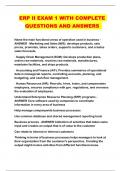
-
ERP II EXAM 1 WITH COMPLETE QUESTIONS AND ANSWERS
- Exam (elaborations) • 26 pages • 2024
- Available in package deal
-
- $9.99
- + learn more
ERP II EXAM 1 WITH COMPLETE QUESTIONS AND ANSWERS ...
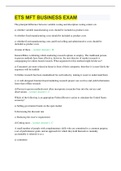
-
ETS MFT BUSINESS EXAM | Answered Correctly! Summer 2022-23.
- Exam (elaborations) • 37 pages • 2023
-
- $12.59
- 6x sold
- + learn more
ETS MFT BUSINESS EXAM The principal difference between variable costing and absorption costing centers on: a) whether variable manufacturing costs should be included as product costs b) whether fixed manufacturing costs should be included as product costs c) whether fixed manufacturing costs and fixed selling and administrative costs should be included as product costs d) none of these. General Bikes is debating which marketing research options to employ. The traditional p...
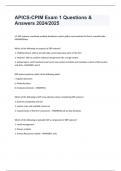
-
APICS-CPIM Exam 1 Questions & Answers 2024/2025
- Exam (elaborations) • 13 pages • 2024
-
Available in package deal
-
- $8.99
- + learn more
APICS-CPIM Exam 1 Questions & Answers 2024/2025 t/f: ERP systems coordinate multiple databases used to gather and maintain the firm's essential data - ANSWERSfalse Which of the following are aspects of ERP systems? 1. Multifunctional- able to provide data concerning many parts of the firm 2. Modular- able to combine selected components into a single system 3. Independent- each functional area has its own system and data and maintains control of that system and data - ANSWERS1 and 2...
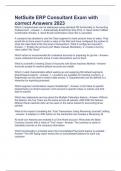
-
NetSuite Suitefoundation Exam Bundle
- Package deal • 26 items • 2023
-
- $35.49
- + learn more
NetSuite Suitefoundation Sample Exam with complete solutions Netsuite SuiteFoundation Study Guide latest updated NetSuite Foundations Exam Pt. 1: Enable Features Questions and Answers NRM NetSuite ERP Consultant Exam Prep Questions and Answers NetSuite Suite Foundation EXAM 1 - ENABLING FEATURES Netsuite Developer II Certification Study Guide with
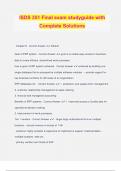
-
ISDS 351 Final exam studyguide with Complete Solutions
- Exam (elaborations) • 15 pages • 2024
- Available in package deal
-
- $12.49
- + learn more
ISDS 351 Final exam studyguide with Complete Solutions Chapter 8 - Correct Answer ️️ -Default Goal of ERP system - Correct Answer ️️ -goal is to enable easy access to business data & create efficient, streamlined work processes how is goal of ERP system achieved - Correct Answer ️️ -achieved by building one single database that is accessed by multiple software modules ----provide support for key business functions for diff areas of an organization ERP databases (3): - Correct...
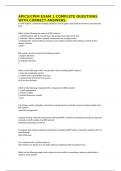
-
APICS/CPIM EXAM 1 COMPLETE QUESTIONS WITH CORRECT ANSWERS.
- Exam (elaborations) • 11 pages • 2024
-
- $10.09
- + learn more
APICS/CPIM EXAM 1 COMPLETE QUESTIONS WITH CORRECT ANSWERS. t/f: ERP systems coordinate multiple databases used to gather and maintain the firm's essential data false Which of the following are aspects of ERP systems? 1. Multifunctional- able to provide data concerning many parts of the firm 2. Modular- able to combine selected components into a single system 3. Independent- each functional area has its own system and data and maintains control of that system and data 1 and 2 ERP...
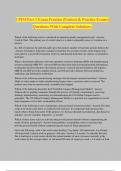
-
CPIM Part 1 Exam Practice (Posttest & Practice Exams) Questions With Complete Solutions.
- Exam (elaborations) • 9 pages • 2024
- Available in package deal
-
- $11.49
- + learn more
CPIM Part 1 Exam Practice (Posttest & Practice Exams) Questions With Complete Solutions. Which of the following tools is considered an important quality management tool? -Answer- Control Chart. The primary use of control charts is to detect assignable causes of variation in a process. In a bill of material, the path that adds up to the greatest number of lead time periods defines the: -Answer-Cumulative lead time; cumulative lead time for an items consists of the longest lead time path fo...
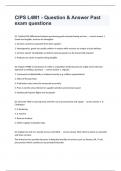
-
CIPS L4M1 - Question & Answer Past exam questions fully solved 2024/2025
- Exam (elaborations) • 16 pages • 2024
- Available in package deal
-
- $20.49
- + learn more
CIPS L4M1 - Question & Answer Past exam questionsO1. Outline FIVE differences between purchasing goods and purchasing services. - correct answer 1. Goods are tangible, services are intangible: 2. Services cannot be separated from their supplier: 3. Heterogeneity: goods are usually uniform in nature while services are unique at each delivery 4. Services 'perish' immediately on delivery whereas goods can be stored until required 5. Products are easier to specify, being tangible O2. Expla...
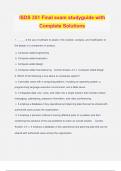
-
ISDS 351 Final exam studyguide with Complete Solutions
- Exam (elaborations) • 26 pages • 2024
- Available in package deal
-
- $13.49
- + learn more
ISDS 351 Final exam studyguide with Complete Solutions 1. _____ is the use of software to assist in the creation, analysis, and modification of the design of a component or product. a. Computer-aided engineering b. Computer-aided evaluation c. Computer-aided design d. Computer-aided manufacturing - Correct Answer ️️ -c. Computer-aided design 2. Which of the following is true about an enterprise system? a. It provides users with a computing platform, including an operating system, a ...
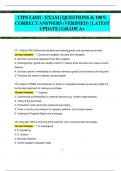
-
CIPS L4M1 - EXAM | QUESTIONS & 100% CORRECT ANSWERS (VERIFIED) | LATEST UPDATE | GRADEA+
- Exam (elaborations) • 21 pages • 2024
- Available in package deal
-
- $11.49
- + learn more
CIPS L4M1 - EXAM | QUESTIONS & 100% CORRECT ANSWERS (VERIFIED) | LATEST UPDATE | GRADEA+ O1. Outline FIVE differences between purchasing goods and purchasing services. Correct Answer: 1. Goods are tangible, services are intangible: 2. Services cannot be separated from their supplier: 3. Heterogeneity: goods are usually uniform in nature while services are unique at each delivery 4. Services 'perish' immediately on delivery whereas goods can be stored until required 5. Products are...

How much did you already spend on Stuvia? Imagine there are plenty more of you out there paying for study notes, but this time YOU are the seller. Ka-ching! Discover all about earning on Stuvia


